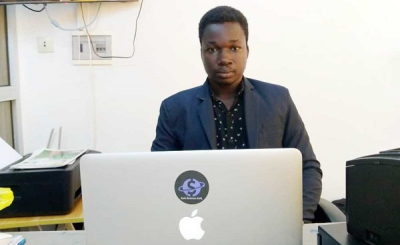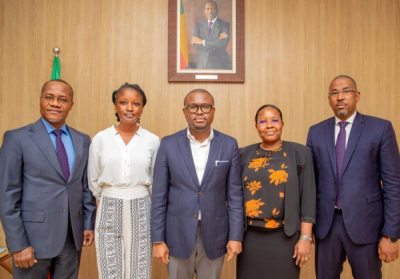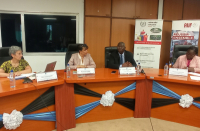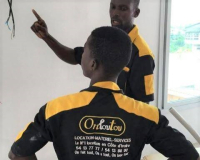In Africa, the development of digital infrastructures is a key prerequisite for an effective digital transformation, which is accelerated since 2020. The additional financing committed by the two partners will help the continent develop the needed infrastructure.
British International Investment (BII) and FMO announced Tuesday (July 27), a joint US116 million commitment to the fourth Africa Infrastructure Fund (AIIF4). As the lead investor, BII committed US$76 million against US$40 million by the FMO.
The fund, managed by African Infrastructure Investment Managers (AIIM), seeks to raise a total of US$500 million. Part of the fund will finance digital infrastructure (including mobile telecom towers, data centers, and fiber networks) in Africa.
“For over a decade, BII has proudly been an active partner to AIIM, an institutional fund manager with long-term industry expertise and on-ground knowledge of the Africa infrastructure space. We are pleased [...] to mobilize further capital to help meet AIIF4’s target size, playing a role in meeting Africa’s infrastructure needs. AIIF4 aligns with BII’s core infrastructure strategy, and we are confident that our capital will help modernize cities and services and accelerate social and economic prosperity for people and communities across the continent,” said Ryan Wagner, BII’s Head of Infrastructure and Climate Funds.
In 2020, the coronavirus pandemic forced African countries to accelerate their digital transformation. The need for high-speed connectivity and digital services is increasing. It is therefore essential to invest in the development of internet networks as well as data storage and security infrastructures.
The digital infrastructure that AIIF4 will help develop "will support inclusive development, improve standards of living for consumers and accelerate sustainable economic growth within many countries across the continent," according to BII.
Samira Njoya
Over the past five years, the number of start-ups founded and run by women has increased significantly in Africa. But, many problems still hinder the growth of those businesses. Various initiatives are being created by development partners to deal with those problems.
The United Nations Economic Commission for Africa (UNECA) and Venture Building's Betacube program launched an incubation program, Tech African Women (TAW), yesterday (July 28). The program is focused on women-led technology start-ups still in the idea stage. Its first edition will target Ethiopia, Senegal, Tanzania, and Tunisia.
TAW aims to empower female tech innovators, leverage their skills to build strong tech companies from scratch, accelerate the transformation of their project ideas into validated business models, and develop alliances between different African ecosystems.
Applications are open until August 10, 2022, for Tunisia, and August 17, 2022, for Ethiopia, Senegal, and Tanzania at the official address www.techafricanwomen.com. To participate in TAW, applicants must be aged between 18 and 35 and be fluent in English or French.
Tech entrepreneurs selected for the program will take part in a 3-day intensive training and pitch competition organized in partnership with actors from each of their various local tech ecosystems. The winning team from each camp will receive a US$2,000 cash prize.
The top 2 startups from each country will then take part in a 2-month online incubation program to be prepared to enter the market and attract investments.
Later, in December, the top eight startups will take part in a pitching competition to select the best startup, which will win a cash grant of US$7,000.
In Sub-Saharan Africa, the majority of the population is unbanked or underbanked. To fill the gap left by mainstream financial institutions, startups are developing various tech solutions.
Djamo is a fintech solution developed by Ivorian startup DJAMO Holding Ltd. It issues visa cards to its users, facilitating their online transactions.
“Bank access is really difficult here [in Côte d’Ivoire]. We saw this difficulty as a huge opportunity. Our aim since inception has been to develop a mobile-first platform that could attract the masses. Our combined experience in the creation of consumer goods has been crucial in the launch of Djamo,” explained co-founder Hassan Bourgi.
By using its Android and iOS apps, Djamo clients can create an account and order a prepaid Visa card, which will be delivered within 48 hours. Users can load their Djamo Visa cards using mobile money or bank transfers. Then, they can easily make online purchases, benefiting from Djamo’s 3D secure technology. They can also easily block or unblock their cards (in the event of losing them or being stolen).
From 2019 to 2021, the fintech had close to 90,000 users with some 50,000 transactions processed monthly. In February 2021, it was selected for Y Combinator’s accelerator program, becoming the first Ivorian startup to join the program. Its participation in the winter program entitled it to US$125,000 seed funding. Overall, since its creation, Djamo Holding has secured over US$450,000 to support its growth.
Adoni Conrad Quenum
The young entrepreneur wants to contribute to financial inclusion and economic development in his country. His digital payment solution already boasts more than 70,000 users.
Jules Kader Kaboré (photo) is a Burkinabe programmer and co-founder of Sank Business, a money transfer company launched in January 2021.
His company developed Sank Pay, a mobile payment app enabling users to make fee-free deposits. Users can also secure loans and make withdrawals with fees amounting to about 1% of transactions.
“At Sank Business, our goal is to lift Burkina Faso into the ranks of African countries that have fully-digitalized economies, by 2025,” Jules said in December 2021.
Through Sank Business, the latter issues payment cards that have no expiration date and are renewable at will. Its cards enable people with no internet access to carry out cashless financial transactions.
Jules Kader Kaboré launched Sank Business after a few years in the U.S. tech industry. In 2016, he worked as an intern web developer for Ignition 72, a Maryland-based internet marketing agency. From September to December 2018, he became a math tutor at Laney College in California.
A few months after his stint at Laney College, along with some Burkinabe students based in the USA, he developed Coucou-Africa, a solution that allows users to buy or sell goods in Africa and even get the latest information about the continent.
Melchior Koba
Currently, in Africa, the on-demand transportation market is mainly controlled by multinationals. Despite the competition, local tech entrepreneurs are moving to conquer it with more suited solutions.
Mapauto is a digital solution developed by a Segealese car rental agency. It allows its users to rent cars with drivers for errands in major Senegalese cities. The solution was launched, in 2020, by tech entrepreneur Mapenda Diop.
According to the latter, in Dakar, it was usually difficult to rent cars with drivers meeting international standards and being at the same time affordable. So, he assembled a team of young local talents to develop a digital solution allowing users to conveniently rent cars at competitive prices.
Its mobile app is available for Android and iOS devices. Once installed, it enables users to access all of the services offered by Mapauto. Upon registration, users can request rides from the airport to major neighborhoods in Dakar, or rent both cars and drivers for a whole day or a single trip, depending on the need.
Thanks to its integrated tracking system, Mapauto monitors its fleets in real-time. The tracking system also presents estimated waiting times to clients when they book a car. It also gives clients the identity of the driver coming to pick them up and the cost of the ride or errand.
Drivers drive Mapauto’s exclusive fleet made of prestigious cars like Peugeot 508 and Maserati Levante.
During an interview given in late 2021, when he was asked whether Mapauto is apprehensive of announced competition in the local car rental market, Mapenda Diop explained that far from being a threat, the arrival of new actors/competitors is a sign that the market has growth potentials. He explained that Mapauto would have to leverage technology to streamline its services. In the meantime, the startup expects to expand into the West African region first and then conquer the whole of Africa. By 2026, it hopes it would create over a thousand jobs.
Adoni Conrad Quenum
The deal comes a few days after Benin officially introduced biometric ID cards, canceling the issuance of old cards.
Trade facilitation solution provider Webb Fontaine announced Monday (July 25), a deal with Beninese authorities to implement its Customs Webb solution. The new artificial intelligence-based solution will replace ASYCUDA World, the old IT system used by Benin customs.
The deal is the result of a partnership binding Benin and Webb Fontaine since 2018. According to Alain Hinkati, Director General of Benin Customs, “Customs Webb, Webb Fontaine’s Customs system, based on artificial intelligence, was chosen by Benin to continue the modernization of customs and optimize the trade environment.”
“Webb Fontaine’s ability to provide cutting-edge technology and digital solutions is a guarantee of success. With this new system, the objective of the public authorities to make Benin an exemplary platform in the simplification and transparency of Customs clearance procedures has taken a major step forward,” he added.
The deal to implement Customs Webb follows a decision issued by the Ministerial council on July 6, 2022. It is in line with the government’s ambition to make Benin a model country whose customs clearance procedure is clear and simple.
Customs Webb's main objective will be to interconnect all the main commercial platforms such as the single window, the community port system, and the electronic goods tracking solution.
In January 2018, Webb Fontaine launched the Single Window for Foreign Trade (GUCE), a platform through which pre-clearance and trade inspection documents can be requested.
With Customs Webb, Benin is taking another step toward the digital transformation of its public and private sector. A few days ago, the country officially introduced biometric identity cards, canceling the issuance of the old non-biometric card.
Samira Njoya
Instant messaging apps have demonstrated their worth over the past few years. However, the majority of the well-known apps are developed by Western actors. With Masolo, DR Congo can become one of the global countries with a major instant messaging app.
Masolo is an instant messenger app developed by Congolese startup Etidlabs. It allows users to send instant messages and media or make video/audio calls. In Lingala -one of the four most spoken languages in DR Congo, Masolo means “conversations.” It is some sort of pledge from the Congolese startup to facilitate and secure online chats.
The messenger app was initially developed for students at the University of Kinshasa. It aimed to democratize instant messaging within the university, which had no reliable internet connection. But, Etidlabs quickly realized that Masolo could be a great business in a country with more than 100 million inhabitants.
Apart from the features usually found with most of its competitors, the Congolese app has new acclaimed features and wants to add others. “We want to make Masolo an integrated platform that can offer several features (banking, e-commerce, gaming, news) and facilitate Congolese living conditions. We have added some Congolese and African touch to our stickers,” indicates Michel Matalatala, one of Etidlabs’ five co-founders.
The messaging app is available for Android and iOS devices. It has a security feature that prevents recipients from forwarding messages or taking screenshots of conversations. That feature, which is absent from the other instant messaging apps (except Snapchat maybe), demonstrates the Congolese startup’s commitment to offering new services and added security to its users.
Adoni Conrad Quenum
In Africa, the coronavirus pandemic demonstrated the need for e-learning initiatives. However, some constraints still affect the development of those initiatives. One of those constraints is teachers’ low ICT adoption. It is, therefore, crucial to train them on how to use IT tools to share their knowledge.
The Francophone University Agency (AUF), on Monday, July 25, kicked off a training session to train teachers in e-learning course designing and scripting. The training session is launched in the framework of Africa Digital Campus, which aims to boost distance learning.
For Ouidad Tebbaa, Regional Director of the Francophone Universities Association (AUF) in West Africa, “the AUF aims to train teachers who will constitute a skill pool to be used by the universities of Burkina Faso and Benin.”
“The project wants to boost the e-learning offer. It will provide the universities with adequate infrastructure and build teachers’ capacities in the e-learning field,” she added.
For two weeks, 69 teachers from Burkinabe public and private universities will be trained in course scripting and designing. They will become bridges assisting other teachers who are yet to grasp the importance of ICT in education.
“Digitilizing education requires paradigm shifts. We need to review pedagogical approaches and consider digitalization not as a constraint but as an opportunity,” explained Jean Marie Dipama, president of the Virtual University of Burkina Faso (UV-BF).
Throughout 2022, Africa digital campus will organize similar training sessions in other countries. The 2-year program is funded by the European Union to the tune of €2.8 million. It focuses on four key areas, notably developing e-learning, modernizing infrastructure and equipment to allow students and teachers to easily access learning platforms, knowledge sharing as well as awareness-raising to convince decision-makers to support the development of connectivity solutions.
Thanks to the training sessions organized by the AUF, 121 courses (for seven training programs) will be accessible on the UV-BF’s platform.
Samira Njoya
In Africa, the digital ticketing system is nascent. However, Morrocan startup Guichet wants to develop it further and conquer the whole of Africa.
Moroccan digital ticketing platform "Guichet" announced, Friday (July 22), the official launch of its Senegalese subsidiary. The new subsidiary, based in Dakar, is the result of a strategic partnership with a Senegalese operator.
For Guichet founder and CEO Ahmed Tawfik Moulnakhla, Senegal is a strategic market. "Morocco and Senegal are sister countries, whose exemplary relations embody an ambitious and inspiring model of South-South cooperation. By setting up [its subsidiary] in Dakar, Guichet wants to contribute to the exceptional dynamism of Senegal’s culture and entertainment industries by providing the public with smart ticketing solutions developed in Morocco,” he said.
Guichet, which has been operating in the Moroccan market for three years now, just passed the mark of one million tickets sold online. This is an unprecedented performance in the Moroccan entertainment industry. The ticketing platform wants to replicate this performance in the Senegalese market, which is its first step out of its native country, Morocco.
The Senegalese subsidiary is a test for Ahmed Tawfik Moulnakhla who wants to conquer the whole of Africa in the coming years.
Despite a difficult start, over the years, Guichet has managed to gain the trust of the Moroccan public by offering them the possibility to buy tickets online. The platform, which has Android and iOS apps, offers the possibility to buy tickets for concerts, sporting events, festivals, etc. In Morocco, it has organized more than 2,000 events.
Samira Njoya
The Tech revolution is heating up worldwide with tech entrepreneurs developing solutions to make life easier for the population. In Africa particularly, startups are introducing new concepts.
Onloutou is a digital platform developed by an eponymous Ivorian startup specializing in property (electrical appliances notably) leasing. It allows users to rent various properties with no security deposits. The startup founded in 2019 operates in Côte d’Ivoire, Guinea, Burkina Faso, and Gabon.
Its digital platform has a mobile app, available for Android devices. Using the mobile app, users can register to rent the various properties available for lease on the platform. Those properties notably include graders, loaders, real estate properties, do-it-yourself items, household appliances, etc. It also gives the possibility to hire tilers, seamstresses, or interior designers.
To protect itself against lessees who can flee with its properties, Onloutou places geolocation devices on most of its leased properties. Thanks to those devices, it can remotely deactivate the equipment, rendering them useless for the lessees.
With Onloutou, property leasing is simple. It only requires an ID card from its clients to process leasing transactions. Currently, it claims over a thousand happy clients and some fifteen awards. In 2019, the startup took part in banking group BCP’s Open Innovation program, which is better known as Fintech Challenge. It emerged among the top six winners among 1200 applicants from several countries.
Adoni Conrad Quenum
More...
In Africa, last-mile delivery services are gradually picking up. Although it may seem a novelty in some regions, startups active in the industry are developing solutions with hopes to attract a wider audience.
Magic is a mobile app launched, this year, by a Guinean logistics startup. It allows users to purchase products (food, drugs, etc) and get them delivered to their doorstep.
According to Abdoulaye Diallo (photo), CEO of Magic Guinea, the startup that developed the app was founded in 2017. Currently, it is operational in the capital city Conakry and its surroundings (Coyah and Dubrééka), Mamou, Labé, and Kamsar. It will soon start operations in Nzérékoré, Abdoulaye Diallo indicates.
The app is accessible for Android and iOS devices. Once registered, users can access its services like having food delivered, sending a check to a bank, sending someone to pay one’s bills, or making market and administrative errands. The app automatically sends quotes for the services chosen and once the order is validated, a courier takes care of the errand as quickly as possible.
Magic includes geolocation features that allow users to locate the nearest shops, restaurants, etc. The features also enable real-time monitoring of the order delivery process. Magic Guinea claims over a thousand downloads of its app. It also has notable Guinean companies among its subscribers and hopes to convince more people in a country where delivery services are novelties for the time being.
Adoni Conrad Quenum
Morocco embarked on a digital transformation journey years ago. Thanks to the various partnerships and agreements it has already signed, the country expects to digitize all of its public services by 2025.
In Morocco, the Ministry of Justice is moving to accelerate its digital transformation. Indeed, on Friday, July 22, in Rabat, Justice Minister Abdellatif Ouahbi signed a memorandum of understanding with the Ministry of Digital Transformation, represented by Digital Minister Ghita Mezzour.
In the framework of that memorandum, the Ministry of Digital Transformation will offer technical assistance for the implementation of the Ministry of Justice’s digital projects. The two ministries will also share experience and collaborate on human resource development. Notably, the memorandum will oversee the interconnection of the Ministry of Justice’s digital platforms and allow the Ministry of Justice to use digital participatory platforms.
According to Abdellatif Ouahbi, the digital transformation of the Ministry of Justice is a strategic move aimed at rendering its services more accessible to users. “In the coming months, the Ministry will redesign its websites and digitize its justice services,” he said. He explained that with digitalization, the justice system will be accelerated since data can now be securely exchanged in real-time between departments.
The acceleration of the Ministry of Justice’s digital transformation is in line with the country’s digital transformation strategy (Maroc Digital 2020 and 2025) launched in 2016. The national digital transformation strategy aims to reduce the divide. Its ambition is to digitize at least 50% of administrative procedures and connect at least 20% of Moroccan SMEs to the internet by 2025.
As Minister Ghita Mezzour explains, in its new development model, Morrocco considers the digitization of public services a tool to improve economic, social, and territorial integration.
Samira Njoya
In Africa, fintech startups are gradually gaining ground, offering exclusive services to users. Thanks to its new mobile app, Studely becomes the first startup to allow students to remotely open a bank account in Paris.
Cameroonian consulting firm Studely launched Friday (July 22), its fintech app StudelyApp in Brazzaville, Congo. The app was launched during a ceremony attended by administrative authorities, entrepreneurs and students.
According to Studely co-founder and CEO Duplex Kamgang (photo, left), the mobile app complements the visa assistance services rendered by Studely.
“StudelyApp has been developed [...] to help students remotely open a bank account in Paris. It gives them the possibility to become banked while facilitating the payment of their school and housing fees. When they enter France or Germany, they just have to purchase a Mastercard for their bank transactions,” he explains.
The innovation was praised by Congolese Minister of Digital Economy Léon Juste Ibombo, who estimated that the app would enrich the Congolese ecosystem of practical solutions addressing the challenges faced by students who travel abroad. With its new service, Studely becomes the first global startup to develop a solution for the problems faced by students when they are required to pay their school ad housing fees before landing in Europe for their studies. The app is already available for Android devices. In the coming days, it will also be available for iOS users.
Studely was founded in 2015 to assist students in the visa application process for their studies in Europe, France, and Germany notably. Its assists in the obtention of proof of financial support, accommodation research, travel or home insurance, and bank account opening. The fintech is already present in fifteen countries and claims over 10,000 students assisted.
Before launching the StudelyApp in Congo, it had already launched the solution in Gabon and the Democratic Republic of Congo.
Samira Njoya
He has some fifteen years of professional experience in several sectors, including the digital sector. By contributing his international expertise, he wants to support his country’s tech ecosystem.
Harinjaka Ratozamanana (photo) is a Malagasy consultant and co-founder of Hackoragna Cooperative Company, a digital cooperation platform. His platform, founded in 2020, gathers startups and VSMEs, which develop innovative tech solutions, in a bid to promote local tech talents.
According to the Hackoragna Cooperative Company’s website, the platform adopts a cooperative approach to help its members better develop their entrepreneurial projects by following a fair and ethical process. By doing so, the members help Madagascar achieve positive transformation and improve its industrial sector. “Let’s co-create a digital economy that works for the common good and our mutual benefit,” Harinjaka invites.
The latter has an extensive professional career. From 2007 to 2009, he was an observer for French media France 24 and an author for the international bloggers’ community Global Voices. In 2008, he started working as a web developer for Fanamby, an environmental non-profit organization. In 2009, he was a web and new media consultant reporting on the Gabonese election for several foreign media. Two years later, he became the senior communications officer of the humanitarian organization Akbaraly Foundation.
He later joined the tour operators’ association GOTO Madagascar as a web consultant. In 2012, he made his first entry into the tech entrepreneurship world by co-founding Habaka, a tech innovation space that he led till 2016.
In 2015, his international IT expertise was requested by the Malagasy government, which appointed him as technical advisor of the Ministry of Digital Transformation. The following year, he became a parliamentary assistant and Director General of Private Sector Development at the Ministry of Commerce the year after.
In July 2018, Harinjaka Ratozamanana was reassigned to the Ministry of Digital Transformation but, this time around, he was chief of staff and then secretary general. In September 2021, he became the associate edtech advisor for IAMTHECODE Foundation, an organization that aims to train one million women and girls in computer coding by 2030.
Melchior Koba















